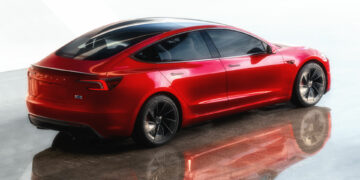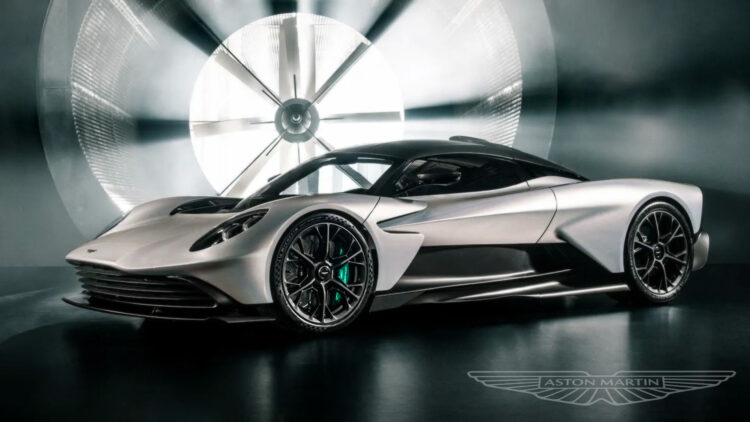In a groundbreaking development, Aston Martin, the iconic British luxury car manufacturer, has secured a £9 million government grant through the Advanced Propulsion Centre UK (APC) to fuel its high-performance electrification strategy. The grant, awarded after a rigorous competitive process, will give a significant boost to Aston Martin's ongoing research and development of a revolutionary modular battery electric vehicle (BEV) platform.
This injection of funds will not only support the creation of Aston Martin's luxury BEV platform, but also pave the way for a net-zero future. The grant is earmarked for crucial areas such as vehicle light weighting, the implementation of a digital toolchain and electrification training. This marks a pivotal moment in Aston Martin's broader ‘Racing. Green.' sustainability strategy.
The electrification journey is part of Aston Martin's ambitious £2 billion commitment to advanced technologies over the next five years, transitioning from internal combustion engine (ICE) to BEV technology. Project ELEVATION, a collaborative effort led by Aston Martin, involves partners such as the Manufacturing Technology Centre, Expert Tooling & Automation, Creative Composites, Fuzzy Logic Studio and WMG, University of Warwick. Together, they aim to tackle the technical challenges of developing an 800V traction battery pack and twin front electric drive unit (EDU) for a modular BEV platform spanning from supercars to SUVs.
Roberto Fedeli, Group Chief Technology Officer of Aston Martin, expressed enthusiasm about the funding, stating, “The award of funding from the APC is another major boost to our electrification strategy and constant strive for innovation.” He emphasised that this support would help them become a leader in BEV technology within the ultra-luxury, high-performance segment.
Ian Constance, APC Chief Executive, acknowledged the diversity of OEMs (Original Equipment Manufacturers) and suppliers involved in the project. He stated, “This latest announcement includes a diverse set of OEMs and suppliers that demonstrate the strength of UK automotive.” Constance highlighted the impact that the APC has made in the UK, with over £1.4 billion invested in automotive projects since its establishment.
Aston Martin's vision extends beyond the traditional internal combustion engine, with plans to launch its first all-electric vehicle in 2025. In 2024, the company aims to deliver its first plug-in hybrid, the Valhalla. This is expected to ship with a top speed of 217 mph and a 0 to 60 of around 2.5 seconds. Given that the Valhalla sports car will be 0.6 seconds slower to 60mph than the 4-door Tesla Model S Plaid by the time it launches, it's clear why Aston Martin needs every bit of available capital for development.
By 2026, all new Aston Martin models will offer an electrified powertrain option, with the ultimate goal of fully electrifying its core range by 2030. That is a full 5 years ahead of the latest Government target.
Based in Gaydon, England, Aston Martin Lagonda designs, creates, and exports cars which are sold in 56 countries around the world. Its sports cars are manufactured in Gaydon with its luxury DBX SUV range proudly manufactured in St Athan, Wales.
This development forms part of a much more complete story about the regeneration and transformation of the Midlands, toward a carbon-neutral future. E-On is working with nearby Coventry Council to spearhead a green revolution in energy – including the building of a 30 megawatt solar farm.
The story of Aston Martin's electrification journey aligns with its broader vision – to be the world's most desirable, ultra-luxury British brand, crafting exquisitely addictive performance cars. Founded in 1913, the company is synonymous with style, luxury, performance, and exclusivity.
As its journey unfolds, Aston Martin Lagonda is not just transforming its vehicles but also its manufacturing facilities. The company is on track to deliver net-zero manufacturing facilities by 2030 – aligning with its commitment to sustainability.
From its birth in 1899 as Lagonda to the merger with Aston Martin in 1947, the company has evolved and adapted. In 2020, Lawrence Stroll assumed the role of Executive Chairman, bringing significant new investment and propelling Aston Martin back to the pinnacle of motorsport with the creation of the Aston Martin Aramco Cognizant Formula One Team.
The tale of Aston Martin's electrification is not just about harnessing the power of electricity; it's a story of innovation, sustainability and a commitment to shaping the future of luxury performance cars.




















Discussion about this post